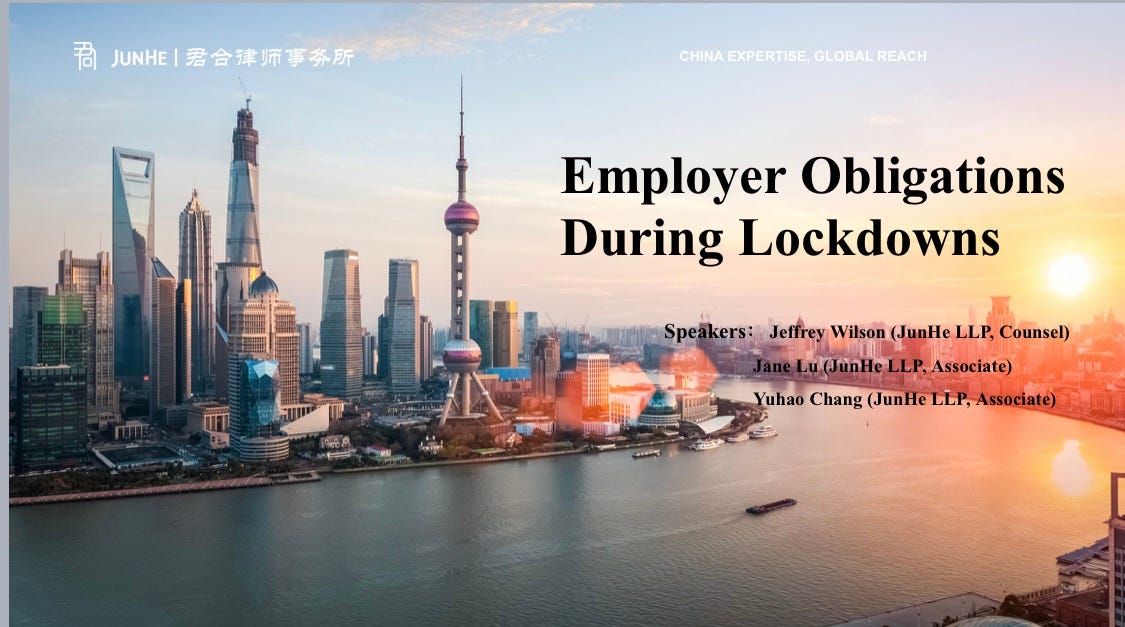The following is a summary of my discussion with colleagues Jane Lu and Chang Yuhao during our April 15 webinar on employment-related issues in the current China lockdowns.
If you want to view a recording of the webinar, here’s the link: https://lawyerscloud.cn/Share/train?p=NTIy
Takeaways from the webinar:
● No significant national or local laws or regulations are likely to be issued because of the ongoing lockdowns. Instead, employers should expect that the rules and guidance issued after the initial covid period in 2020 will continue to apply. Local jurisdictions may be expected to issue rules and guidance regarding lockdown policies, particularly how lockdown restrictions will be eased and lifted.
● Shanghai and other cities have adopted a three-tier approach for geographic zones based on the presence of covid cases:closed-off, controlled, and precautionary. These zones determine, in part, the mobility of individuals within the zones.
● Under Shanghai’s current approach, an individual could go to work only if the residence and workplace of the individual are both in the same Shanghai subdistrict and both are designated as precautionary zones. Still, authorities in charge of the residential area and the workplace could still exert substantial discretion prohibiting theindividual from leaving the residential area or accessing the workplace. As a result of these policies, absent government approval, few employees are expected to report to workplaces in the near future.
● While certain cities, such as Xi’an, have required that no positive zero covid tests be reported before the cities were reopened, Shanghai may follow a less stringent approach, such as possibly allowing phased opening based on subdistricts not having positive test results.
● Employers are required to pay full salary to employees who are prevented from going to work because of mandatory treatment for confirmed covid cases or because they are in quarantine due to suspected cases or are close contacts.
● Employers are encouraged to have employees work from home. For employees who cannot work from home, employers areencouraged to treat lockdown time as use of paid annual leave or other available leave.
● If all leave has been exhausted, and there is a business necessity to reduce costs, employers are encouraged to negotiate with employees on agreements regarding no-pay leave or salary reductions.
● If all or a portion of an employer’s business is suspended, an employer could be permitted to unilaterally reduce salaries to the local minimum wage after a full wage payment cycle (i.e., usually one month).
● Under current Shanghai practice, employees who are working at the employer worksite during a lockdown may return home butcould not return to the workplace.
● While certain industries have remained operating during the lockdown, it is possiblethat a gradual reopening could include employers being permitted to apply with government authorities on a case-by-case basis to allow employees to return to the workplace.
● Even when employees are permitted to return to the workplace, stringent controls are expected, such as employee PCR tests every 48 hours and no access to the workplace by third parties.
● Lockdowns and the inability of employees to report to the workplace or work from home would themselves alone not be grounds for employee termination. Corporate restructuring or elimination of departments or job functions prompted by a lockdown possibly could be termination grounds.
● While employers have no legal obligation to assist employees during a lockdown, many employers have been assisting employees by sourcing and delivering food. Some employers have been offering counseling services.
● Onboarding of employees during lockdowns is continuing by means of execution of electronic contracts and delaying of hard copy contracts. Some employers are delaying start dates or revoking offers with the agreement of affected individuals. Employers who unilaterally revoke offers before individuals have commenced work would generally be subject only to contract claims, not employment claims.
● Usual overtime rules would apply for employees working at home during lockdowns. Many employers would continue to require that any overtime work be subject to prior supervisor approval. Some employers have adopted systems of requiring employees to be available for portion of the workday, such as 10 a.m. to 3 p.m.
● Exit procedures may be delayed for employees who resign or whose contracts expire during lockdowns. Expiring contracts would automatically extend for employees who are in medical treatment periods due to covid infections, who are in medical observation or isolation periods due to possible infections, or who are unable to work due to government emergency measures. The law is not clear whether contracts of employees who are subject to lockdowns in individual housing compounds would automatically extend until theemployees are no longer subject to lockdowns. This issue may be clarified by local authorities.
● While employers (and employees) cannotlikely expect to receive cash allowances during the lockdown or recovery period, employers can likely expect to receive government support to reduce operation costs. These measures would be similar to measures introduced during the 2020 initial covid period, such as tax reductions, lower rates for social insurance contributions, and reduction of rental amounts if property is leased from government agencies or state-owned enterprises.
● Most employment arbitration and litigation proceedings have been postponed. Still, hearings for a few cases in Shanghai duringthe current lockdown are being handled online.



